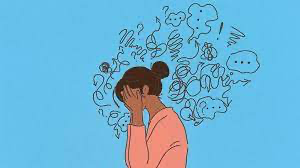Anxiety: How It Correlates With What We View

Let’s start out with the facts…
Anxiety is a term that has become more and more frequent over the years. Feeling anxious has become a normal way to explain one’s emotional state. However, there is a difference between feeling nervous and feeling anxious. Nervousness is simply a symptom of anxiety, but anxiety can lead to anxiety disorders. Mayo Clinic says it best: “Anxiety can be normal in stressful situations such as public speaking or taking a test. Anxiety is only an indicator of underlying disease when feelings become excessive, all-consuming, and interfere with daily living.”
A constant feeling of anxiety can lead to anxiety disorders and according to helpguide.org, using social media more often increases fear of missing out and feelings of inadequacy, dissatisfaction, and isolation. In turn, these feelings negatively affect your mood and worsen symptoms of depression, anxiety, and stress. According to a survey taken on adolescents by news10, “Kids and teens spend a lot of time on social media. Between five to seven and a half hours a day, according to a 2019 survey from Common Sense Media.” In a poll taken by 330 adolescents, 77 percent of them said social media has negatively impacted their mental health.

If anxiety disorders occur when you are constantly experiencing anxiety – whether once or multiple times a day – and kids and adolescents are spending about five to seven and half hours a day on social media, then throw in the anxiety kids and adolescents feel and receive from social media, are we surprised that the numbers of anxiety disorders in our generation are at an all-time high? Are we surprised that an estimated 31.9% of adolescents have had some form of anxiety disorder?
We are living in unprecedented times where technology and media are at a complete turning point. These statistics are normal for times like these. However, to get these nauseating facts to change, we have to learn and adapt to the things that are poisoning our generation. We have to bring awareness to the things that are hurting us more than they are helping. We have to learn how to adapt and regulate these things.
Social media is not all bad. There are so many fruitful ideas, thoughts, relationships, and money that come from this web of people. However, in these troubling times, the truth and the message behind these ideas need to come out. Why are we letting an app on our phone, a website on our computer and an image on our tablets determine who we are, and what we struggle with? We are shooting ourselves in the arm and then trying to patch it up with the same thing that hurt us.
 We have become so content with what we are comfortable with. Yes, social media enhances anxiety, yet we love being on it. So you would rather compromise your happiness and well-being for twenty minutes of scrolling? You would rather feed your disease than simply delete an app? We let our worth get sucked into the number of likes we get from a certain photo, we let our identity be shaped by the words of an avatar, and our feelings – our everyday lives – are wavered by the picture we paint of ourselves to mask the insecurities of our most beautiful qualities. We are not who people think or say we are. We are not who we create ourselves to be online.
We have become so content with what we are comfortable with. Yes, social media enhances anxiety, yet we love being on it. So you would rather compromise your happiness and well-being for twenty minutes of scrolling? You would rather feed your disease than simply delete an app? We let our worth get sucked into the number of likes we get from a certain photo, we let our identity be shaped by the words of an avatar, and our feelings – our everyday lives – are wavered by the picture we paint of ourselves to mask the insecurities of our most beautiful qualities. We are not who people think or say we are. We are not who we create ourselves to be online.
 We are simply creations of different sizes and colors, created beautifully and purposefully to accomplish the goals Christ has called us into. Let’s stop letting an app have power over us. Let’s stop giving power where power should not be. Let’s stop caving and yielding to something we have full authority over. We don’t have to live in a state of anxiety. Deleting Instagram will not instantly make your anxiety go away. But everything is good in moderation and regulations aren’t always the worst thing. The freedom that comes from letting go and not giving power to something that has been slowly draining you for so long is astonishing.
We are simply creations of different sizes and colors, created beautifully and purposefully to accomplish the goals Christ has called us into. Let’s stop letting an app have power over us. Let’s stop giving power where power should not be. Let’s stop caving and yielding to something we have full authority over. We don’t have to live in a state of anxiety. Deleting Instagram will not instantly make your anxiety go away. But everything is good in moderation and regulations aren’t always the worst thing. The freedom that comes from letting go and not giving power to something that has been slowly draining you for so long is astonishing.
NCU’s Writing for Media class investigates the high percentage of anxiety of our current society.





